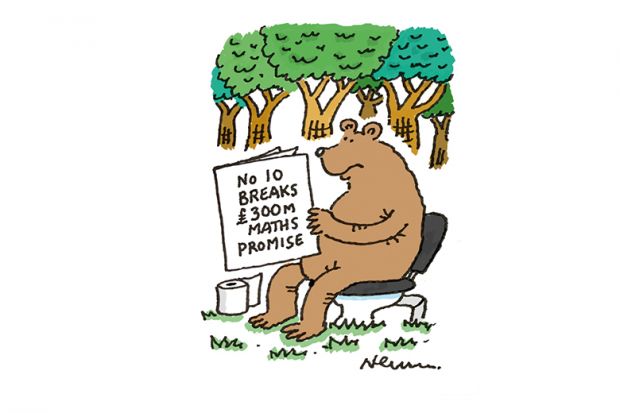
When Boris Johnson announced an extra £300 million for maths research just six weeks after winning a thumping 80-seat majority in December 2019, it seemed to mark the start of a new era of big spending on UK science. Things haven’t exactly worked out to plan with the Treasury junking plans to double research spending to £22 billion a year by 2024 at the last Budget. So the news that the much-vaunted maths funding designed to “fund experimental and imaginative mathematical sciences research by the very best global talent over the next five years” hasn’t arrived may not be a huge surprise. Backtracking on such a high-profile promise was, however, a “concerning” move, according to Greg Clark, the former universities minister whose committee wheedled the information out of UK Research and Innovation chief executive Ottoline Leyser at a parliamentary hearing. “The only reason for not doing it is that the government has deprioritised mathematics,” the MP added. Science minister George Freeman told the committee that he hoped to “honour this commitment, somehow” but if the pledge couldn’t be fulfilled when announcing a £25 billion three-year research budget last month, then when will it?
Securing prime real estate can be notoriously expensive for universities but the $21,000 (£17,100) paid by a Texas institution for a few square centimetres may have set a new record. Nevertheless, the University of Texas at San Antonio seems quite pleased with its latest property – a square on the San Antonio version of Monopoly, in which local businesses, restaurants and universities replace the high-end New York or London properties on the Hasbro-owned game, The Chronicle of Higher Education reported. The university, which splurged a total of $60,000 on its unusual investments, including almost $9,000 in gift boxsets, described it as a “fun way to create greater awareness of San Antonio and UTSA and to reach prospective students and their parents”. Snapping up the spot next to “Go to Jail” might not be such a bad idea, however, since US organisations clearly feel strongly about Monopoly: the owner of one business excluded from a Massachusetts version fed boxes of the game into a wood chipper to register his disgust, according to local media.
Forget flipped learning, gamification or interactive lectures – if you want to fully engage students, use yoga, a new study suggests. Teachers in any higher education setting “can increase the possibilities for bodily performance” by, for example, getting students to “physically demonstrate” their thoughts about an issue, according to a paper in Teaching in Higher Education. Callie Maddox, who co-authored the study, told Times Higher Education that her yoga training had “catalysed a change in her teaching” at Miami University. “I stood differently in front of my students. I breathed differently. I noticed my students differently. In an incredibly physical way, I felt entirely present,” she said. Unfortunately, college classrooms, whether in person or online, “continue to largely be spaces of intellectual work divorced from substantial consciousness of physicality”, the study laments.
Cider has often featured prominently in university life – although usually only in boozy pub quizzes or nights out on the town. That will soon change, however, after the University of Bristol announced it will offer a module in cider-making to biological science students. Master’s student Alex Graham has so far been providing the experience to students “for fun” but the skills will now be included in the undergraduate curriculum, he told the BBC. He said he was hopeful the new module would attract people “due to the love of the science”, with his professor Keith Edwards calling the processes used by industrial brewers “incredibly complex”.
The Oxford Union has hosted plenty of passionate and inspiring speakers in its time – but also some clunkers who, dare we say it, have been a tad robotic. That latter description was more accurate than ever, however, after the famous debating society staged an event in which speeches were generated by artificial intelligence. For the first time, avatars of four dead authors – William Shakespeare, Jane Austen, Oscar Wilde and Winston Churchill – were asked to move the motion: “This house believes most of the world’s content will soon be created by AI”, The Times reported. The most convincing speech came from Churchill, the organisers stated, whose machine-generated speech warned the assembled crowd about “a grave threat to our society” and urged that listeners should “defend our right to control our own minds”.
Register to continue
Why register?
- Registration is free and only takes a moment
- Once registered, you can read 3 articles a month
- Sign up for our newsletter
Subscribe
Or subscribe for unlimited access to:
- Unlimited access to news, views, insights & reviews
- Digital editions
- Digital access to THE’s university and college rankings analysis
Already registered or a current subscriber? Login



